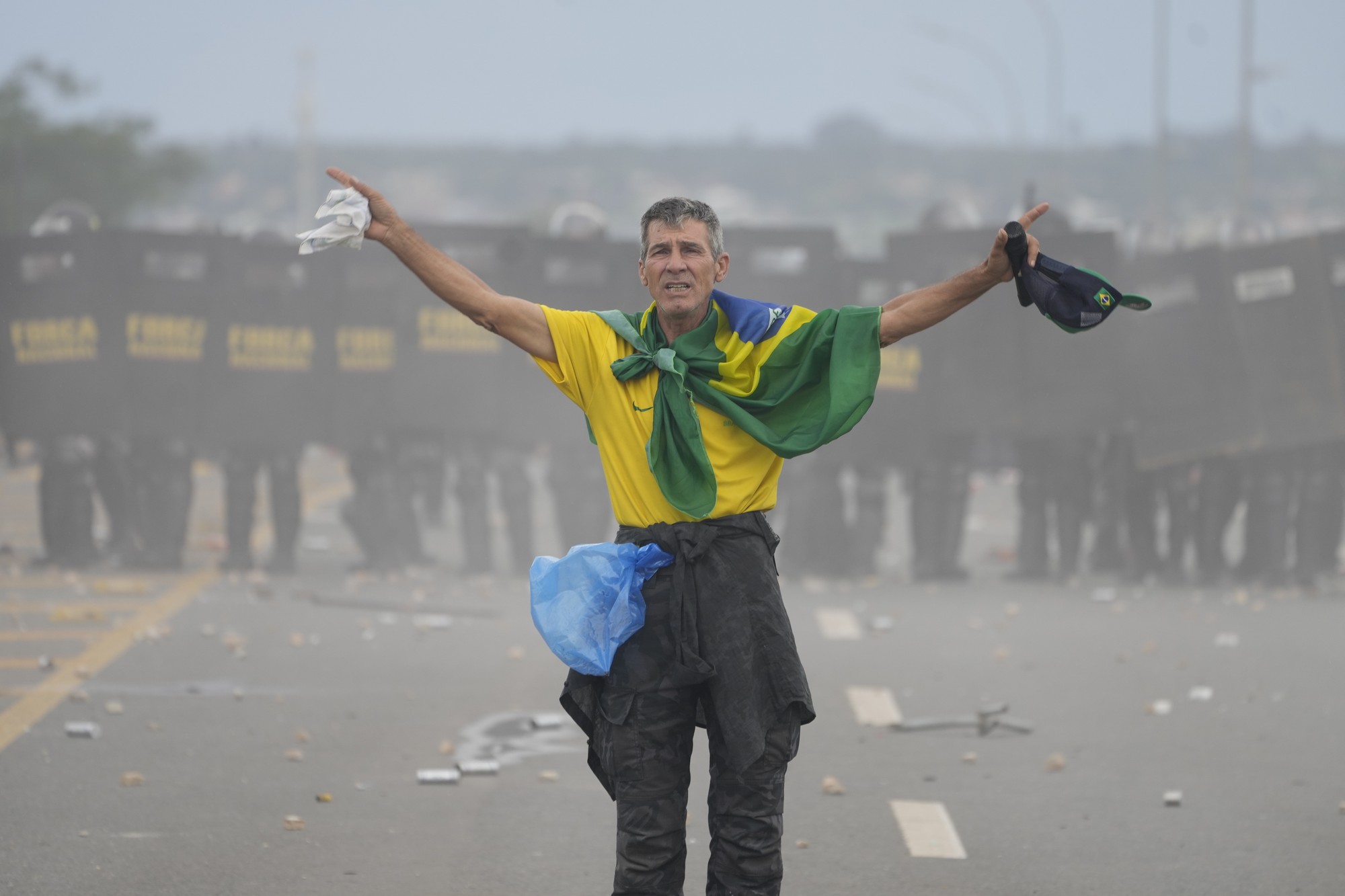Jair Bolsonaro’s supporters stormed the national congress in Brasilia, Brazil’s capital, on Jan. 8, destroying windows, raiding offices and chanting for military intervention against the winner of the recent election, leftist President Luiz Inácio Lula da Silva.
They did that while draped in an infamous symbol, the canarinho, the colours of Brazil’s national soccer team.
The jersey has become part of the uniform for Bolsonaristas, much like the red MAGA ball cap that is part of the garb for Trump supporters. Brazilian authorities moved swiftly to arrest top public officials and about 2,100 rioters were initially arrested.
Leonardo Coelho Assunção Santa Rita was only a child when Brazil, wearing the iconic yellow and green Canarinho jersey, won its record-setting fifth World Cup in 2002. A result that filled the country with the jubilant power of football to unite.
Santa Rita now sees a different and nefarious meaning behind the colours.
“Bolsonaro and his supporters absorbed all national symbols as fascists often do, they took the symbols for themselves,” he said. “The national team jersey is one of the things that’s been co-opted.”
“I know some people are now uncomfortable to be seen with the jersey because they don’t want to be associated with Bolsonaro,” Santa Rita said.
The Canarinho since its debut on the world stage at the 1950 World Cup, has been present alongside the country’s hardships, including a military dictatorship in the 1970s and multiple periods of economic instability in the 1980s. Throughout it all, the yellow and green offered a rallying call for the country.
Once beautiful and apolitical, the jersey now serves as a sobering reminder of the country’s fractured political climate.
Santa Rita, a lifelong football fan, is currently a master’s student at the Pontifical University of Minas Gerais in Belo Horizonte, Brazil. Although a believer in the sport’s ability to breathe life into Brazilian society, he also sees the ways football has been traditionally used as a tool to sway the public.
“Football here in Brazil turns political when the morale of the population is down,” he said. “Football can mitigate, can elevate the population’s spirit, affecting political outcomes, especially in elections.”
Football has often been described as a 90-minute escape from all the inconveniences of life. And no one has given the globe escapes like Brazil’s ‘Seleção’. Dazzled by legends such as Pele, Garrincha, Socrates, and Ronaldo, the nation is the undisputed king of the sport, all with a borderline defiant style of the jogo bonito, the beautiful game.
Yet, no matter the world’s rose-tinted expectation of kids kicking the ball around the alleys of São Paulo or the beautiful beaches of Rio, the country’s greatest sport has ties to darker times.
Santa Rita points towards a controversial figure of Brazil’s past, Getúlio Vargas, the 14th and 17th president of Brazil as the starting block. Vargas came to power after the corrupt government of the 1920s. He created the Estado Novo, an authoritarian regime that puts a focus on nationalism to win support.
“Vargas wanted to create a national symbol for Brazil. Football and samba, various cultural symbols people took for granted, and Vargas’ government used them well,” Santa Rita said. “He was responsible for football being the national symbol for Brazil, he crafted it.”
“They say that politics and football don’t relate with each other but that’s a great lie,” Santa Rita said.
Currently, Maria Eduarda Azeredo, a 24-year-old Brazilian international relations graduate, sees ultranationalism fuelled far-right conservatism as a key profiteer of football’s importance to Brazil.
“What we have is the Bolsonarista appropriation of the national team jersey, an ownership,” Azeredo said. “This is pure integralism, psychological in nature and symbolic.”
“And of course, we have football, the famous bread and circus, a huge event for Brazilians and they end up forgetting these fundamental issues to just enjoy the show,” she said.
“It is not the first time that Brazil has had extreme right-wing politicians who claim this discourse,” Azeredo said. “This discourse of family, god, and tradition is due to complex long-term cultural factors in Brazil.”
It wasn’t always like this. A brighter yesterday harbours in Azeredo’s memories.
“The most striking memory was of fraternization and unity, everyone was there to cheer for the team and the country,” she said. “The schools and streets in the neighbourhood were always decorated with the colours of the national flag. We felt a union, passion, and fun.”
Meg Stalcup, associate professor of anthropology at Ottawa University, never watched sports while growing up. That all changed after travelling to Brazil for a World Cup.
“The whole country stopped for the World Cup. I was with a caravan of Brazilian friends driving through the interior of the country for the final,” Stalcup said. “We stopped in a very small town. People put TVs in the windows and turned them to the streets so that everyone could watch.”
Stalcup, who received a master’s degree in biological sciences at the Federal University of Rio de Janeiro, believes the sport’s greatest quality was and remains its genuine appeal, regardless of which forces wielded it.
“Football is a real, shared heritage in Brazil, and a success that for many years the country could feel was theirs,” she said. “The kind of football that Pelé made famous came to represent something the nation could hold its head high.”
Stalcup is unsure whether the Canarinho can ever return to its former status of just being the jersey of Brazil’s team.
“The camisa da seleção, the flag, even wearing the colours of the flag, is now something a segment of the population will avoid to not be mistaken for supporters of Bolsonaro,” she said. “There have been efforts to reclaim it but it remains to be seen if these will be successful.”

